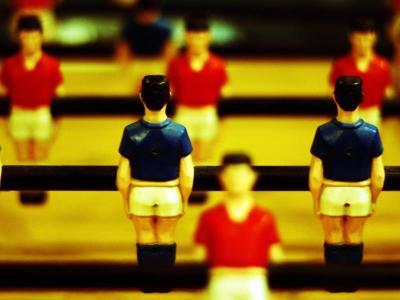Impact in science; we now spend $5 billion a year on STEM programs, trying to convince American children who are inclined to be doctors that they should instead be scientists, while foreign science students educated in the US are forced to go back home where they become competitors to the US.
It isn't just in science that ridiculous protectionism has been shown to be bad. Various countries in Europe have long limited the number of 'foreign' players on their sports teams. By foreign, that usually meant from outside Europe. Like in science, European politicians contended that if foreign players were allowed, the performance of the national team would suffer.
Not so, says new research which attempts to analyze the impact caused by the liberalization of the labor market in European football brought about by the Bosman Rule, a 1995 court decision which lifted the rights of teams to block transfers by EU players but within the EU.

The national team improves when foreign players are allowed to be on clubs, according to new research. Credit: Lita Bosch
"It's funny that we (Spain) won the World Cup precisely when the number of foreign football players in the Spanish league increased so dramatically, because up until now, nobody had mentioned the fact that the foreign players could have a positive impact on the national players' training", says Professor Juan de Dios Tena, of the Universidad Carlos III de Madrid Statistics Department.
The results published in Labour Economics were carried out by the Sports Economics research group, whose members are Professor David Forrest, of Salford University (England), Ismael Sanz, of Universidad Rey Juan Carlos (King Juan Carlos University), and Jaime Álvarez, of the Universidad Complutense of Madrid. The general objective of this group, which also includes Ramón Flores, of UC3M's Statistics Department, is to use sports economics as an experimental field in which to study questions of interest to society, such as the impact of globalization on industry competitiveness. "The great advantage of sports economics is that, unlike other areas of economics, the impact of policy actions can be clearly observed in the results of competitions", the researchers explain.
Importance in creative industries
The results of the study can be extrapolated to other industries in which creativity is important, according to the researchers. That is, local workers can benefit, in terms of skills and ability, from contact with new techniques and practices that foreign "drafts" use. "We have shown - Professor Tena concludes – that the liberalization of the labor market in creative industries improves and stimulates internal competition and industry performance at the national level".
In carrying out the study, the scientists used statistical analysis and econometric tools to compare the competitive sports balance before and after the enactment of the Bosman Rule. In addition, they examined the results of nearly fifty national basketball teams over a period of more than twenty years, taking into account the number of foreign players in their domestic matches and controlling the impact of other factors, such as the power of the clubs, countries, etc. In this way, they have managed to demonstrate, as the study shows, that an increase in the number of foreigners in a national league tends to generate a subsequent improvement in the national team's performance, although that team is made up of only domestic players.
It's not often America can still learn something from Europe but in this instance, a Bosman rule for foreign scientists would do America a world of good.





Comments